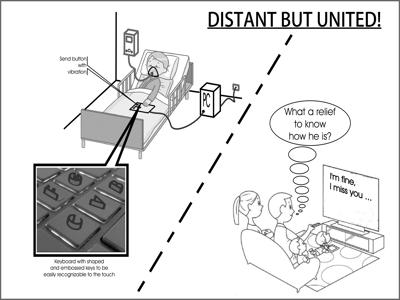The current coronavirus emergency (COVID-19) has led to an exponential increase in healthcare structures of patients with respiratory complications of such a magnitude to require the usage of devices (CPAP masks) and procedures (intubation) which sensibly reduce the ease of communication between patients and health workers and, sadly, even between patients and their relatives. This results in an overall condition of practical and psychological difficulty which weighs on the assisted, on its relatives and friends, on nurses and doctors.
To solve these issues, solutions such as phone or tablet keyboards result in being either too small or not practical, especially because of the posture one is forced to assume . Alternative solutions, often creative and approximate, are used today by health workers, such as alphabetical tablets, which allow a letter-by-letter construction of the information received by or coming from the patient, although this solution requires a considerably high effort, a great quantity of time and often causes frustration on both sides, and most importantly does not take into account speaking with realtives.
We propose an economically accessible device which speeds and simplifies verbal communication: an ad-hoc, compact and intuitive keyboard, with raised keys. This allows to exploit tactile sense reducing the overall patient’s effort thus giving its thougths and necessities rapid and immediate transduction. The results of this translation will be conveyed on a screen which can be positioned at a dsesirable height and distance from the patient itself. It will also be equipped with audio output for photosensitive subjects, shortcut keys, Bluetooth and internet connection, yet open to any supplemental feature.
The main patients to benefit from this device could be COVID-19 subjects with CPAP helmets, post-coma patients no longer intubated, patients with tracheostomies, but also people with any pathology which includes severe vocal faults (e.g. SLA patients).
